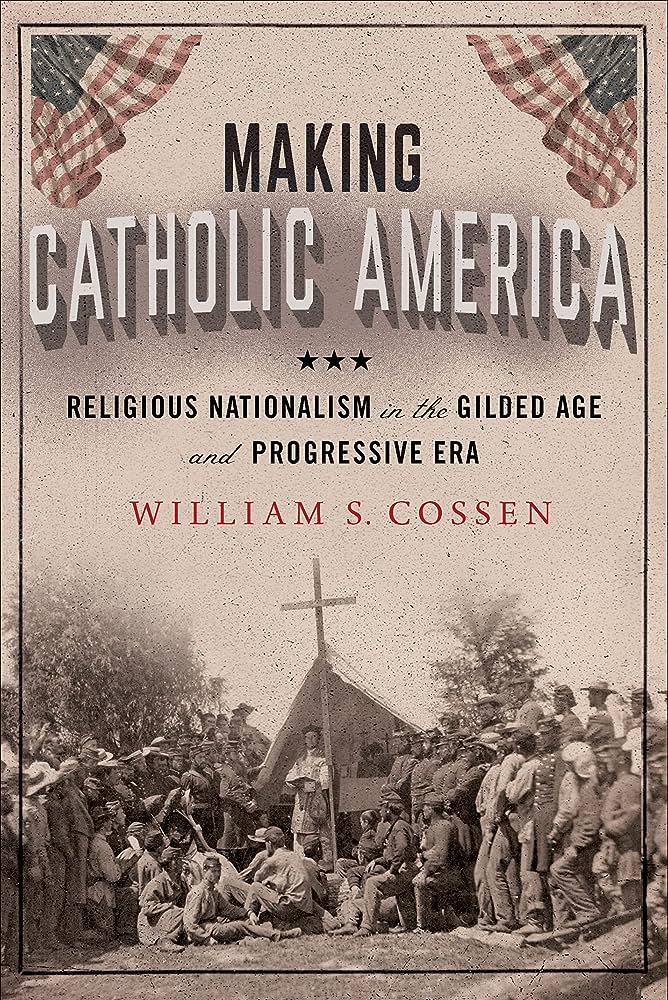

William Cossen is a teacher in the Social Studies Department at The Gwinnett School of Mathematics, Science, and Technology. This interview is based on his new book, Making Catholic America: Religious Nationalism in the Gilded Age and Progressive Era (Cornell University Press, 2023).
JF: What led you to write Making Catholic America?
WC: As with many academics, my first book grew out of my dissertation, but the themes at the book’s core reach back earlier. I entered graduate school at Penn State University hoping to explore U.S. Catholics’ thoughts on the American nation and their place within it. My first real exploration of the ideas that would eventually wind up in the book, though, came during my second year at Penn State, when I took an antebellum U.S. history seminar with one of my co-advisors, Amy S. Greenberg. As part of the seminar, we were tasked with writing a historical introduction to an antebellum book as if a new edition of it were being published. Given my interests in U.S. Catholic history, I selected Maria Monk’s Awful Disclosures of the Hotel Dieu Nunnery. My “introduction” grew into a much larger research project examining Catholics’ perceptions of Protestants (what I called “the Protestant image in the Catholic mind”). This then blended into my prior interest in religion and nationalism and eventually developed (over many, many years!) into Making Catholic America.
JF: In 2 sentences, what is the argument of Making Catholic America?
WC: Catholics played a central role in fashioning the post-Civil War American nation. They not only Americanized Catholicism but also Catholicized America in the process.
JF: Why do we need to read Making Catholic America?
WC: The intersection of religion and nationalism is not just a relic of the Gilded Age and Progressive Era, the chronological focus of my book. It is a tremendously important nexus of ideas that shapes our politics, culture, and society today. Catholics remain a large and influential force (as internally diverse and varied as that may be) in the twenty-first-century United States – for example, see the sizable percentages of Catholics in Congress and on the Supreme Court. Gaining a better understanding of how Catholics worked to achieve mainstream acceptance and, indeed, power at the turn of the twentieth century will help readers grasp how this religious community transformed modern notions of America and Americanism.
JF: Why and when did you become an American historian?
WC: My love of history goes back to my childhood. Whether through memorizing presidential trivia or spending hours poring over maps and artifacts my grandparents sent me from a trip they took to Gettysburg (I still have the books, pamphlets, and battlefield relic box from almost thirty years ago!), I derived immense enjoyment from forging connections to the stories, people, and events of the American past. My interest in the subject was further encouraged by my AP US and European History teacher in high school, who I still count as the most significant influence on my decision to pursue a history degree as an undergraduate.
I majored in history and political science in college, but while I enjoyed studying the past, I don’t think I really grasped what history actually was as an academic discipline. It was not until my junior year, when I took an upper-level seminar on nationalism in Europe, that I first began understanding that history was much more than just what happened in the past but was rather an exercise in critical thinking, careful writing, source analysis, argumentation, and historiography.
During my senior year, I applied to and was accepted by several law schools. However, in my very last semester, I took a course on modern Catholicism, which had a profound professional impact on me. This course provided me with my first opportunity to seriously reconsider my career path. I became transfixed by primary-source research, archival work, and the crafting of original historical arguments. During my first and only semester in law school, I kept asking myself, “Why not a career as a historian?” I pushed off my doubts as long as I could, which wound up being until Thanksgiving, at which point I decided to apply to PhD programs in history, and I haven’t looked back since.
JF: What is your next project?
WC: I have two projects up next. The first is ongoing research on lived religion among Catholic soldiers in the Civil War, and the second is a return to earlier work on early to mid-twentieth-century Catholic labor schools, but with an expanded geographic scope and new thematic emphases.
JF: Thanks, William!